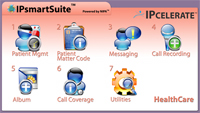 I had a terrific lunch last week with Kevin Brown, CEO and Alok Jain CTO of IPcelerate. This private company, with 55 employees in India, New Jersey and Dallas was founded in 2004 and chartered to focus on creating applications for the Cisco Unified Communications portfolio. Of course, back then it was the Cisco CallManager and leveraged the proprietary protocol SCCP.
I had a terrific lunch last week with Kevin Brown, CEO and Alok Jain CTO of IPcelerate. This private company, with 55 employees in India, New Jersey and Dallas was founded in 2004 and chartered to focus on creating applications for the Cisco Unified Communications portfolio. Of course, back then it was the Cisco CallManager and leveraged the proprietary protocol SCCP.
Their hard work paid off real well. More recently the company upgraded its capabilities to the Cisco UC Manager which requires SIP support. At the Cisco Partner convention in Las Vegas, the IPcelerate product capabilities were presented on stage by Charlie Giancarlo. Certainly that endorsement by the platform vendor will go far in capturing more than the top 80 VARs they already have signed up, and accelerate their deployment beyond the 450 customers they have installed since 2005.
Architecting Applications.
What makes the capabilities of this company so impressive is the architecture. Kevin and Alok have built their business on an architecture called the Network IP Application Development architecture (NIPA). NIPA sub-packages some 40 feature-lettes into a 'click-to-activate' mechanism that works together with the Cisco Unified Communications Manager.
Their idea is based on the abstraction of common workflow and call processing events into an independent layer. The company's developers then studied the daily workflows of target markets – dentists, doctors and school teachers for example – and created packages of features and applications that solved real problems for their work flows. Some of the capabilities include:
- Patient sign in on arrival – patients sign in on the phone in the waiting room using their telephone number and notifications are provided to nurses, doctors and administrators.
- Time and attendance – employees sign in and out using the phone.
- Workflow is confirmed – the night shift is automatically reminded to perform and acknowledge the performance of important inter-shift processes.
Very impressive architecture.
Reseller Relevant
Leveraging an appliance form factor (see my report Where Will UC Take Us? ) positions the company well to transform the humble business communications system into the business process manager – something which is incredibly important for services organizations where the core value of the firm is delivered by the people. In these markets, the BPM can reduce the training requirement of staff and assure quality of the responsiveness dimensions of work. It's that link to quality of responsiveness which no doubt appeals to the owner of the practice or manager of the franchise or the principal of the school.
The capabilities are comprehensive, flexible and pre-packaged for reseller convenience. Through a menu of selections the reseller installer can implement the product for the target market. In more complex deployments or more demanding customer scenarios and processes, the reseller-engineer can use the graphical tool (this was spooky for me since it reminded me of my 2001 startup and our cool graphical tool – the Oplet Studio) the reseller can define the sequence of workflow and process steps that each event will trigger. This is what Communications-enabled Business Processes are supposed to mean.
Next Steps?
Grow. Grow. Grow. Expand addressable market. Interwork with other platforms both within the Cisco portfolio and outside it. Cover more vertical applications. Integrate with other applications.
I do expect that the E911 and notifications capabilities will take on a higher position in the marketing framework given the surge of interest in these products and services since the sad events at Virginia Tech.
IPcelerate is a breath of fresh air in the execution of UC. Their architecture is a big differentiator in how to build real-time applications and business processes for businesses that work in real-time and with people.









